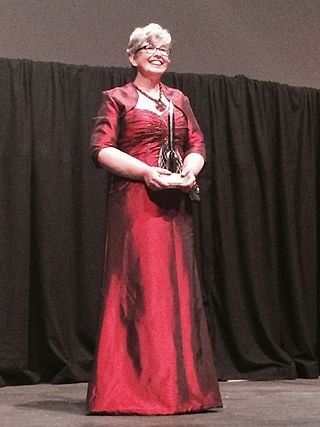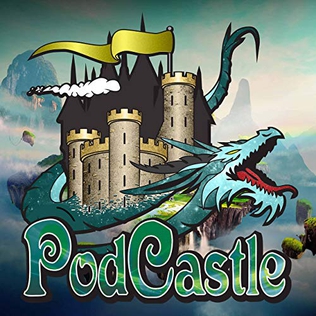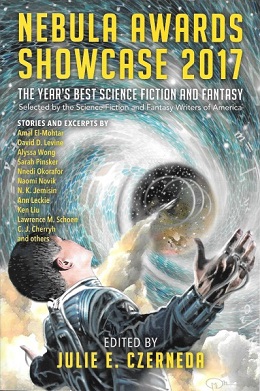Related Research Articles

Interzone is a British fantasy and science fiction magazine. Published since 1982, Interzone is the eighth-longest-running English language science fiction magazine in history, and the longest-running British science fiction (SF) magazine. Stories published in Interzone have been finalists for the Hugo Awards and have won a Nebula Award and numerous British Science Fiction Awards.

Steven H Silver is an American science fiction fan and bibliographer, publisher, author, and editor. He has been nominated for the Hugo Award for Best Fan Writer twelve times and Best Fanzine eight times without winning.
William Sanders was an American speculative fiction writer, primarily noted for his alternate history short fiction, and was the senior editor of the online science fiction magazine Helix SF. He twice won the Sidewise Award for Alternate History and was a finalist for other honors including the Nebula Award.

Martha Wells is an American writer of speculative fiction. She has published a number of science fiction and fantasy (SF/F) novels, young adult novels, media tie-ins, short stories, and nonfiction essays on SF/F subjects; her novels have been translated into twelve languages. Wells is praised for the complex, realistically detailed societies she creates; this is often credited to her academic background in anthropology.
The Science Fiction & Fantasy Poetry Association (SFPA) is a society based in the United States with the aim of fostering an international community of writers and readers interested in poetry pertaining to the genres of science fiction, fantasy, and/or horror. The SFPA oversees the quarterly production of literary journals dedicated to speculative poetry and the annual publication of anthologies associated with awards administered by the organization, i.e. the Rhysling Awards for year's best speculative poems in two length categories and the Dwarf Stars Award for year's best very short speculative poem. Every year since 2013, the SFPA has additionally administered the Elgin Awards for best full-length speculative poetry collection and best speculative chapbook.
Mike Allen is an American news reporter and columnist, as well as an editor and writer of speculative fiction and poetry.
Samantha Henderson is an American science fiction and fantasy writer and poet.

Jason Sanford is an American science fiction author whose 2022 novel Plague Birds was a finalist for the Nebula and Philip K. Dick Awards. He's also known for his short fiction, which has been published in Interzone, Asimov's Science Fiction, Analog Science Fiction and Fact, Year's Best SF 14, InterGalactic Medicine Show and other magazines and anthologies.

Nora Keita Jemisin is an American science fiction and fantasy writer. Her fiction includes a wide range of themes, notably cultural conflict and oppression. Her debut novel, The Hundred Thousand Kingdoms, and the subsequent books in her Inheritance Trilogy received critical acclaim. She has won several awards for her work, including the Locus Award. The three books of her Broken Earth series made her the first author to win the Hugo Award for Best Novel in three consecutive years, as well as the first to win for all three novels in a trilogy. She won a fourth Hugo Award, for Best Novelette, in 2020 for Emergency Skin, and a fifth Hugo Award, for Best Graphic Story, in 2022 for Far Sector. Jemisin was a recipient of the MacArthur Fellows Program Genius Grant in 2020.
Lightspeed is an American online fantasy and science fiction magazine edited and published by John Joseph Adams. The first issue was published in June 2010 and it has maintained a regular monthly schedule since. The magazine published four original stories and four reprints in every issue, in addition to interviews with the authors and other nonfiction. All of the content published in each issue is available for purchase as an ebook and for free on the magazine's website. Lightspeed also made selected stories available as a free podcast, produced by Audie Award–winning editor Stefan Rudnicki.
Rachel Swirsky is an American literary, speculative fiction and fantasy writer, poet, and editor living in Oregon. She was the founding editor of the PodCastle podcast and served as editor from 2008 to 2010. She served as vice president of the Science Fiction and Fantasy Writers of America in 2013.

Ken Liu is an American author of science fiction and fantasy. Liu has won multiple Hugo and Nebula Awards for his novel translations and original short fiction, which has appeared in F&SF, Asimov's Science Fiction, Analog, Lightspeed, Clarkesworld, and multiple "Year's Best" anthologies.

Ann Leckie is an American author of science fiction and fantasy. Her 2013 debut novel Ancillary Justice, which features artificial consciousness and gender-blindness, won the 2014 Hugo Award for "Best Novel", as well as the Nebula Award, the Arthur C. Clarke Award, and the BSFA Award. The sequels, Ancillary Sword and Ancillary Mercy, each won the Locus Award and were nominated for the Nebula Award. Provenance, published in 2017, and Translation State, published in 2023, are also set in the Imperial Radch universe. Leckie's first fantasy novel, The Raven Tower, was published in February 2019.

PodCastle is a weekly audio fantasy fiction podcast. They release audio performances of fantasy short fiction, including all the subgenres of fantasy, including magical realism, urban fantasy, slipstream, high fantasy, and dark fantasy. As of 2022, Shingai Njeri Kagunda and Eleanor R. Wood share editing duties with support from Assistant Editor Sofía Barker and audio producers Devin Martin and Eric Valdes, and the show is mainly hosted by Matt Dovey, with occasional guest hosts.
Abyss & Apex Magazine (A&A) is a long-running, semi-pro online speculative fiction magazine. The title of the zine comes from a quote by Friedrich Nietzsche (1844-1900), "And if you gaze long into the abyss, the abyss gazes also into you." The stories and poetry therefore follow the pattern of "how would humans react?" if a new technology or a type of magic or supernatural power affected them.

Amal El-Mohtar is a Canadian poet and writer of speculative fiction. She is the editor of Goblin Fruit and reviews science fiction and fantasy books for the New York Times Book Review and is best known for the 2019 novella This Is How You Lose the Time War, co-written with Max Gladstone, which won the 2019 Nebula Award for Best Novella, the 2020 Locus Award for Best Novella, the 2020 Hugo Award for Best Novella, and several other awards.

Nebula Awards Showcase 2000 is an anthology of science fiction short works edited by Gregory Benford. It was first published in hardcover and trade paperback by Harcourt in April 2000.

The Nebula Awards Showcase 2011 is an anthology of science fiction short works edited by American writer Kevin J. Anderson. It was first published in trade paperback and ebook by Tor Books in May 2011. The first British edition was published in trade paperback and ebook by Robinson in February 2012 under the alternate title The Mammoth Book of Nebula Awards SF.

Nebula Awards Showcase 2017 is an anthology of science fiction and fantasy short works edited by Canadian writer Julie E. Czerneda. It was first published in trade paperback and ebook by Pyr in May 2017.

R. B. Lemberg is a queer, bigender, and autistic author, poet, and editor of speculative fiction. Their work has been distributed in publications such as Lightspeed, Strange Horizons, Beneath Ceaseless Skies, and Uncanny Magazine, and stories have been featured in anthologies such as Sisters of the Revolution: A Feminist Speculative Fiction Anthology and Transcendent 3: The Year's Best Transgender Speculative Fiction 2017.
References
- ↑ Doctorow, Cory (June 15, 2006). "Helix: a new free sf magazine". Boing Boing. Archived from the original on December 25, 2015. Retrieved December 24, 2015.
- ↑ Frenulum, J. Royce. "Conversations With A Mean Old Bastard". Sff.net. Archived from the original on January 27, 2017. Retrieved 2023-09-09.
- ↑ "Racist Rejection Letter Stirs Controversy in SF Community". Technoccult. 2008-07-15. Archived from the original on 2016-03-04. Retrieved 2023-09-09.
- ↑ Shetterly, Will (2023-03-03). "Was Cherokee Writer William Sanders the First Victim of Cancel Culture?". Sublation Magazine. Archived from the original on 2023-03-07. Retrieved 2023-09-09.
- 1 2 3 4 "Helix SF". The Encyclopedia of Science Fiction . March 22, 2023. Archived from the original on December 1, 2023. Retrieved September 9, 2023.
- 1 2 Sanders, William. "Editorial." Helix SF 10, Fall 2008. [ permanent dead link ]
- ↑ What Happened To The Archives? a brief and depressing explanation, Helix SF, January 1, 2009. [ permanent dead link ]